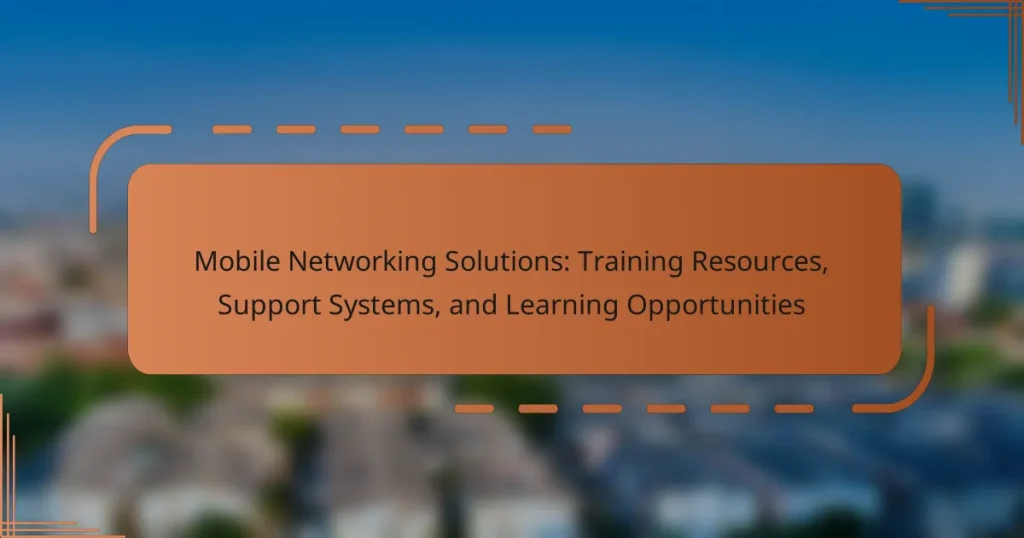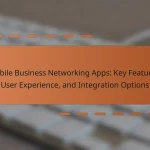Mobile networking solutions enable wireless communication and data transfer across mobile networks, utilizing technologies such as 4G, 5G, and Wi-Fi. This article provides an overview of training resources, support systems, and learning opportunities available for mobile networking technologies. Key topics include online courses, webinars, certification programs, and documentation that enhance user skills and knowledge. Additionally, it explores support mechanisms like technical assistance and community forums that aid users in optimizing their mobile networking solutions. The article highlights the importance of these resources in keeping professionals updated with advancements in the field.
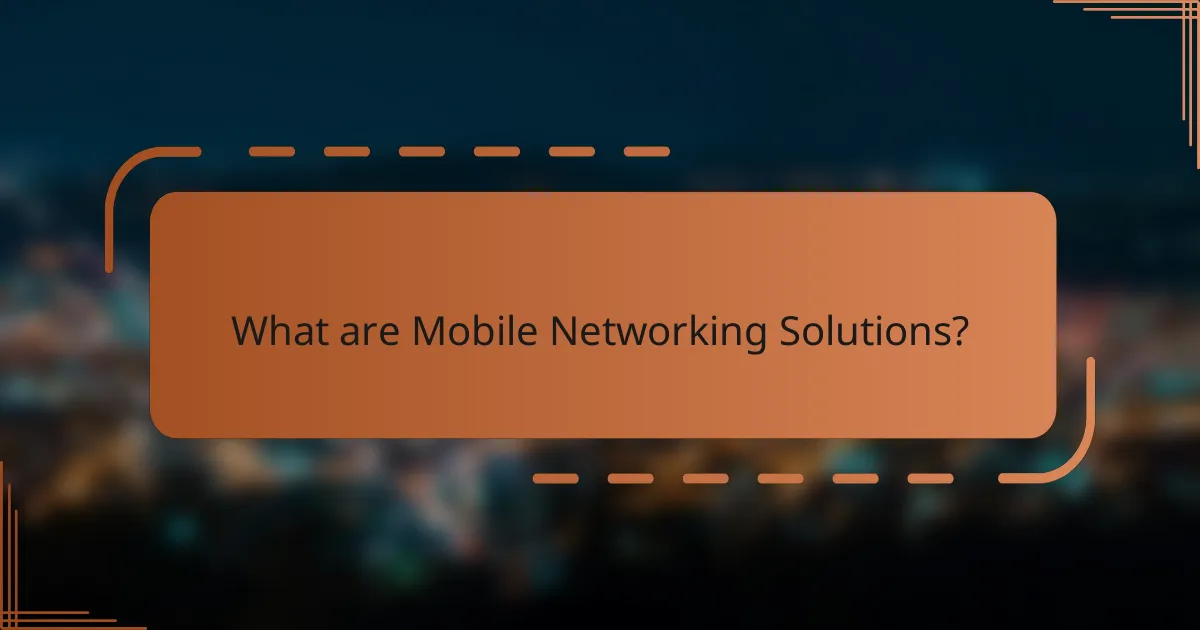
What are Mobile Networking Solutions?
Mobile networking solutions are systems that enable wireless communication and data transfer over mobile networks. They encompass technologies such as 4G, 5G, and Wi-Fi. These solutions facilitate connectivity for devices like smartphones, tablets, and IoT devices. They support various applications, including voice calls, video streaming, and online gaming. Mobile networking solutions are crucial for enhancing user experience and ensuring reliable communication. According to the Global Mobile Suppliers Association, 5G technology is expected to cover one-third of the global population by 2025. This demonstrates the growing importance and implementation of mobile networking solutions worldwide.
How do Mobile Networking Solutions function?
Mobile networking solutions function by enabling wireless communication between devices over a network. They utilize radio frequency signals to connect mobile devices to a network infrastructure. This infrastructure includes base stations, routers, and servers that facilitate data transmission. Mobile networking solutions employ various technologies, such as 4G and 5G, to enhance speed and connectivity. The systems manage user data and ensure secure connections through encryption protocols. Additionally, they support multiple devices simultaneously, optimizing bandwidth usage. Mobile networking solutions are essential for modern communication, with billions of mobile users globally relying on them for connectivity.
What technologies are involved in Mobile Networking Solutions?
Mobile Networking Solutions involve several key technologies. These include 4G LTE and 5G networks, which provide high-speed data transmission. Wi-Fi technology is also crucial for mobile connectivity in various environments. Network function virtualization (NFV) enables the efficient management of network resources. Software-defined networking (SDN) allows for flexible network configuration and management. Additionally, edge computing enhances data processing speed by bringing computation closer to the user. The integration of these technologies supports seamless mobile communication and connectivity.
How do these technologies impact network performance?
Mobile networking technologies significantly enhance network performance. They enable faster data transmission rates through advanced modulation techniques. Technologies like 5G reduce latency, improving real-time communication. Enhanced bandwidth allows more simultaneous connections without degradation. Network slicing optimizes resource allocation for different services. These improvements lead to better user experiences in applications like streaming and gaming. Studies show that 5G can achieve speeds up to 10 Gbps, vastly outperforming previous generations. This performance boost is critical for supporting IoT devices and smart applications.
What are the key benefits of Mobile Networking Solutions?
Mobile Networking Solutions enhance connectivity and flexibility for users. They enable access to networks from various locations, improving productivity. These solutions support a wide range of devices, facilitating communication across platforms. Mobile networking also reduces costs associated with traditional networking infrastructure. According to a report by Cisco, mobile networking can increase operational efficiency by up to 30%. Enhanced security features in mobile networking protect sensitive data during transmission. Additionally, these solutions offer scalability, allowing businesses to grow without significant infrastructure changes. Overall, Mobile Networking Solutions provide significant advantages in efficiency, cost-effectiveness, and security.
How do Mobile Networking Solutions enhance connectivity?
Mobile networking solutions enhance connectivity by providing seamless access to networks across various devices. They utilize advanced technologies like 4G, 5G, and Wi-Fi to ensure high-speed data transmission. This capability allows users to connect to the internet from virtually anywhere. Mobile networking solutions also support a wide range of applications, facilitating real-time communication and data sharing. According to a report by the GSMA, 5G networks can deliver speeds up to 10 Gbps, significantly improving user experience. Additionally, these solutions enable the Internet of Things (IoT), connecting numerous devices for smarter environments. Enhanced connectivity leads to improved productivity and efficiency in both personal and professional settings.
What cost savings can organizations expect from Mobile Networking Solutions?
Organizations can expect significant cost savings from Mobile Networking Solutions. These solutions reduce the need for extensive physical infrastructure. By leveraging cloud services, companies can lower hardware and maintenance expenses. Mobile networking also enhances employee productivity, leading to reduced labor costs. Studies show that organizations can save up to 30% on operational costs by implementing mobile networking. Additionally, mobile solutions minimize travel expenses through improved remote communication. This results in faster decision-making and reduced downtime. Overall, mobile networking solutions provide a cost-effective way to streamline operations and enhance efficiency.
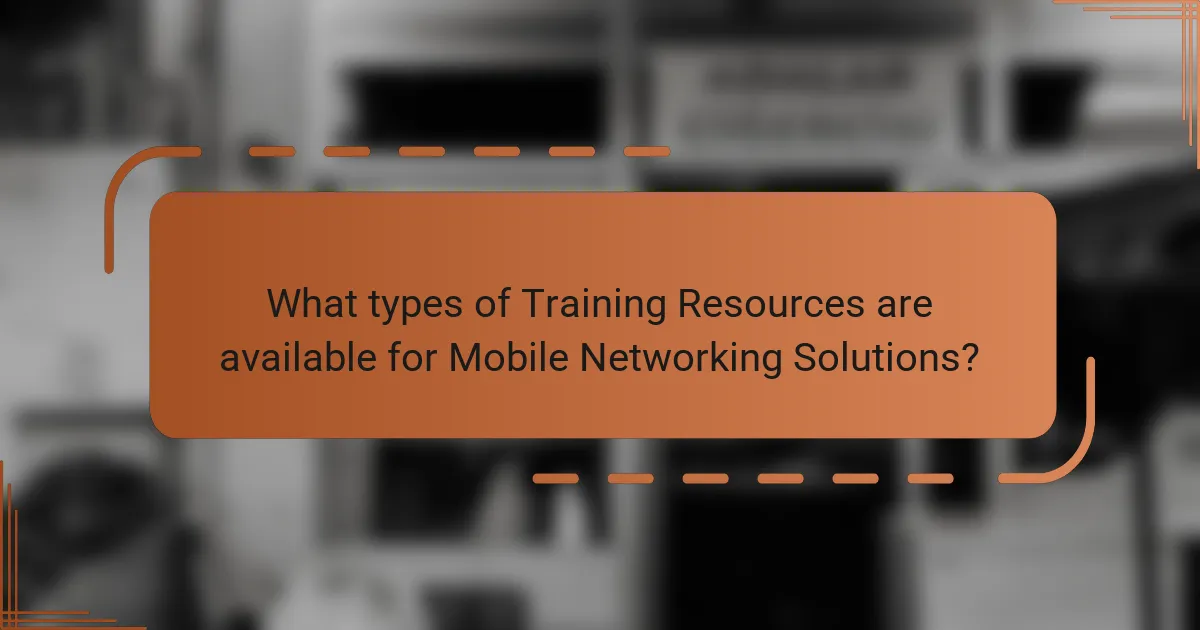
What types of Training Resources are available for Mobile Networking Solutions?
Training resources for mobile networking solutions include online courses, webinars, and certification programs. Online courses provide structured learning and can be accessed at any time. Webinars offer live interaction with experts and allow participants to ask questions. Certification programs validate skills and knowledge in mobile networking technologies. Additionally, documentation and user manuals serve as essential resources for understanding specific systems. Industry conferences and workshops also provide networking opportunities and hands-on training. These resources support both beginners and experienced professionals in enhancing their skills in mobile networking solutions.
How can training improve the use of Mobile Networking Solutions?
Training enhances the use of Mobile Networking Solutions by equipping users with essential skills and knowledge. Users learn to effectively configure and manage mobile networks. This leads to improved performance and reliability. Training also covers troubleshooting techniques, enabling quick resolution of issues. Furthermore, skilled users can optimize network resources, increasing overall efficiency. According to a study by the International Journal of Mobile Networking, organizations with trained staff report a 30% decrease in network downtime. This demonstrates the tangible benefits of training in mobile networking contexts.
What formats are available for training resources?
Training resources are available in various formats. Common formats include online courses, webinars, and instructional videos. Additionally, printed manuals and guides are widely used. Interactive simulations and hands-on workshops are also effective formats. These formats cater to different learning preferences and enhance understanding. Online platforms often provide flexible access to these resources. Research shows that diverse formats improve learner engagement and retention.
How do online courses compare to in-person training sessions?
Online courses offer flexibility and accessibility compared to in-person training sessions. They allow learners to study at their own pace and from any location. In-person training sessions provide direct interaction with instructors and peers. This can enhance engagement and facilitate immediate feedback. According to a study by the U.S. Department of Education, online learning can be as effective as traditional classroom learning when designed well. However, in-person sessions often foster a sense of community and networking opportunities that online formats may lack. Each method has its advantages depending on the learner’s preferences and circumstances.
What role do certifications play in Mobile Networking Solutions training?
Certifications play a crucial role in Mobile Networking Solutions training. They validate the skills and knowledge acquired by individuals in this field. Certifications provide a standardized measure of competency, which is essential for employers. They enhance job prospects and career advancement opportunities for trained professionals. Many employers prefer candidates with relevant certifications when hiring. Certifications also ensure that individuals are up-to-date with the latest technologies and practices. For example, certifications from recognized organizations like Cisco or CompTIA are highly regarded in the industry. This recognition helps professionals stand out in a competitive job market.
Which certifications are most recognized in the industry?
The most recognized certifications in the mobile networking industry include Cisco Certified Network Associate (CCNA), CompTIA Network+, and Certified Wireless Network Administrator (CWNA). CCNA is widely acknowledged for validating networking skills and understanding of mobile technologies. CompTIA Network+ covers essential networking concepts, including mobile networking. CWNA focuses specifically on wireless networking, which is critical in mobile solutions. These certifications are endorsed by industry leaders and are often prerequisites for advanced roles in mobile networking. Their recognition stems from their comprehensive curriculum and alignment with current industry standards.
How can certifications enhance career prospects in mobile networking?
Certifications enhance career prospects in mobile networking by validating skills and knowledge. They signal to employers that candidates possess relevant expertise. Certifications often lead to higher salaries and better job opportunities. According to the Global Knowledge 2021 IT Skills and Salary Report, certified professionals earn 10% more than their non-certified peers. Additionally, certifications can help individuals stand out in a competitive job market. Many employers prioritize candidates with industry-recognized certifications when hiring. Certifications also provide access to a network of professionals and resources in the field. This can lead to further career advancement and opportunities for collaboration.
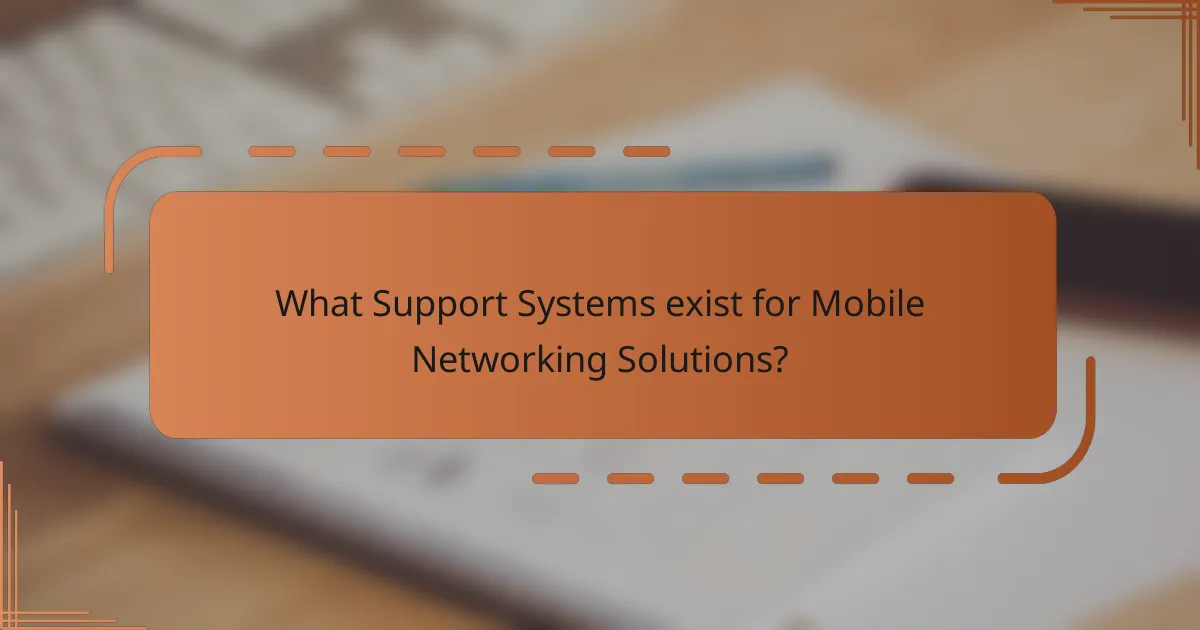
What Support Systems exist for Mobile Networking Solutions?
Support systems for mobile networking solutions include technical support, community forums, and documentation resources. Technical support often consists of help desks and customer service teams that assist with troubleshooting and network issues. Community forums provide platforms for users to share experiences and solutions. Documentation resources include user manuals, installation guides, and online knowledge bases that offer detailed instructions and best practices. These support systems help users optimize their mobile networking solutions and resolve challenges effectively.
How do support systems aid in troubleshooting Mobile Networking Solutions?
Support systems aid in troubleshooting mobile networking solutions by providing structured assistance and resources. They offer technical support through knowledgeable personnel who can address specific issues. These systems often include documentation, FAQs, and troubleshooting guides that help users identify problems. Additionally, support systems facilitate communication between users and experts for real-time problem resolution. They may also utilize diagnostic tools to analyze network performance and pinpoint failures. Efficient support systems can reduce downtime and improve user satisfaction. According to a study by Gartner, effective support systems can enhance troubleshooting efficiency by up to 30%.
What types of support services are commonly offered?
Commonly offered support services in mobile networking solutions include technical support, customer service, and training programs. Technical support assists users with troubleshooting and resolving network issues. Customer service provides information about products and services, addressing inquiries and concerns. Training programs educate users on effective utilization of mobile networking technologies. These services ensure users can effectively operate and optimize their mobile networking solutions.
How can users access these support systems effectively?
Users can access support systems effectively by utilizing multiple channels. These channels include online forums, dedicated support websites, and training resources. Online forums allow users to connect with peers for shared experiences and solutions. Dedicated support websites often provide FAQs, troubleshooting guides, and contact options for direct assistance. Training resources, such as webinars and tutorials, equip users with necessary skills and knowledge. Regularly checking for updates on these platforms ensures users have the latest information. Accessing these systems through mobile devices enhances convenience and responsiveness.
What are the best practices for utilizing support systems in Mobile Networking Solutions?
Utilizing support systems in Mobile Networking Solutions involves several best practices. First, ensure clear communication channels are established. This facilitates quick resolution of issues. Second, leverage knowledge bases for self-service support. Knowledge bases reduce response times and empower users. Third, implement regular training sessions for staff. Continuous education keeps the team updated on new technologies and practices. Fourth, monitor and evaluate support performance metrics. This helps identify areas for improvement. Fifth, encourage feedback from users about the support experience. User feedback drives enhancements to support systems. Lastly, integrate support systems with network management tools. This ensures seamless operations and quicker troubleshooting. These practices enhance overall efficiency and user satisfaction in Mobile Networking Solutions.
How can organizations ensure they maximize support system benefits?
Organizations can maximize support system benefits by implementing structured training programs. These programs should focus on enhancing user competency with the support systems. Regular assessments can identify knowledge gaps and areas for improvement. Providing easy access to resources increases user engagement and efficiency. Feedback mechanisms allow users to report issues and suggest enhancements. Regular updates to the support system ensure it meets evolving user needs. Data analytics can track system usage and highlight areas of success or needed improvement. Research shows that organizations with comprehensive training see a 30% increase in support system utilization.
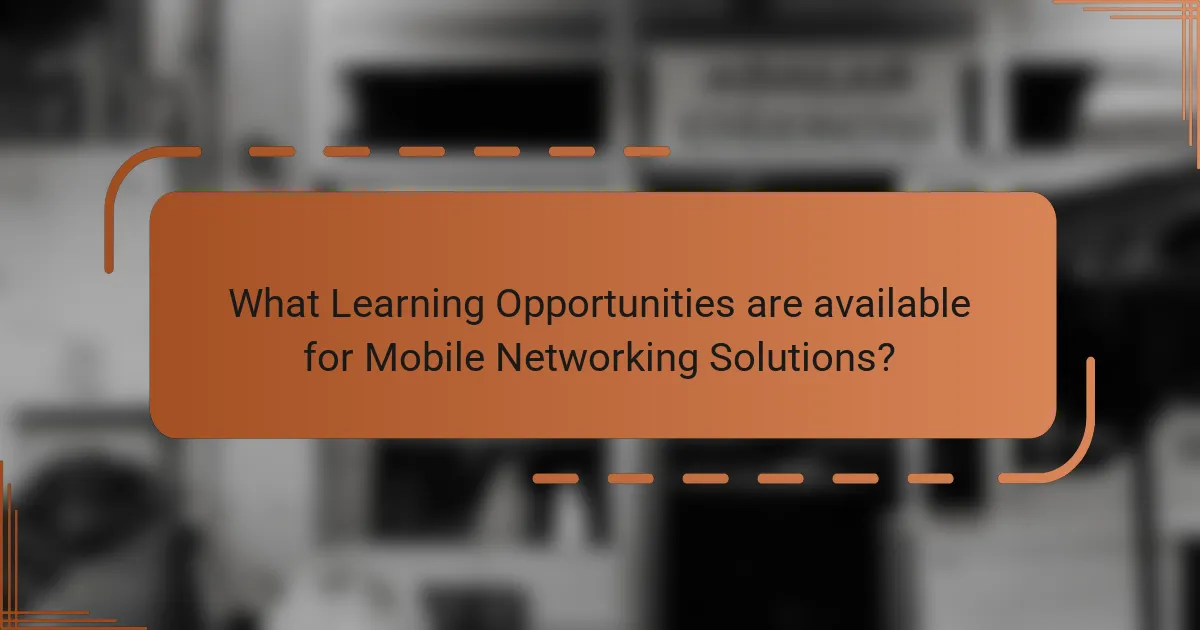
What Learning Opportunities are available for Mobile Networking Solutions?
Learning opportunities for mobile networking solutions include formal education, online courses, and certifications. Institutions like universities offer degree programs in network engineering and telecommunications. Online platforms provide courses on mobile networking technologies, such as Coursera and Udemy. Certifications from organizations like Cisco and CompTIA validate expertise in mobile networking. Workshops and webinars hosted by industry experts cover emerging trends and technologies. Additionally, hands-on labs and simulations allow practical experience with mobile networking tools. These resources ensure individuals stay updated with current advancements in mobile networking.
How can networking professionals stay updated on Mobile Networking Solutions?
Networking professionals can stay updated on Mobile Networking Solutions by engaging in continuous education and following industry news. They can enroll in specialized courses offered by organizations like Cisco and CompTIA. Participating in webinars and online conferences also provides valuable insights. Joining professional associations, such as the IEEE Communications Society, offers access to resources and networking opportunities. Subscribing to industry publications and journals keeps them informed about the latest trends. Following relevant blogs and social media accounts of experts in mobile networking enhances knowledge. Finally, hands-on experience through labs and projects solidifies understanding of new technologies.
What are the benefits of attending industry conferences and workshops?
Attending industry conferences and workshops offers numerous benefits. These events provide networking opportunities with professionals in the field. Participants can share knowledge and best practices. Workshops often include hands-on training with the latest technologies. This practical experience enhances skill development. Conferences typically feature expert speakers sharing industry insights. Access to cutting-edge research and trends is also a key benefit. Furthermore, attendees can discover new tools and resources to improve their work. Overall, these events foster professional growth and collaboration among peers.
How can webinars and online seminars enhance knowledge in mobile networking?
Webinars and online seminars enhance knowledge in mobile networking by providing accessible, real-time education. They offer expert insights on current trends and technologies in the field. Participants can engage with industry leaders and ask questions directly. This interaction fosters a deeper understanding of complex concepts. Online platforms allow for diverse learning formats, including presentations, discussions, and Q&A sessions. Research shows that interactive learning increases retention rates. According to a study by the University of Wisconsin, interactive webinars can improve knowledge retention by up to 60%. Additionally, these sessions can be recorded for later review, allowing learners to revisit material as needed. This flexibility supports continuous learning in a rapidly evolving field.
What are the common challenges faced in learning about Mobile Networking Solutions?
Common challenges in learning about Mobile Networking Solutions include complexity and rapid technological changes. The field involves intricate concepts such as protocols, architectures, and security measures. These topics can be overwhelming for beginners. Additionally, the fast-paced evolution of mobile technology means that learners must continuously update their knowledge. Limited access to hands-on experience can hinder practical understanding. Resources may be scattered and not easily accessible, making it difficult to find comprehensive training. Furthermore, varying levels of prior knowledge among learners can lead to disparities in understanding.
How can learners overcome these challenges effectively?
Learners can overcome challenges in mobile networking solutions by utilizing structured training resources. These resources include online courses and workshops that provide practical skills. Support systems like mentorship programs can enhance understanding and application of concepts. Active participation in forums and discussion groups fosters collaboration and knowledge sharing. Engaging with real-world projects allows learners to apply theoretical knowledge effectively. Regular assessments help identify areas for improvement and reinforce learning. Research indicates that hands-on experience significantly boosts retention and comprehension in technical fields.
What tips can help maximize the effectiveness of training and support in Mobile Networking Solutions?
To maximize the effectiveness of training and support in Mobile Networking Solutions, implement hands-on training sessions. Practical experience enhances understanding and retention of concepts. Utilize real-world scenarios to demonstrate applications of mobile networking solutions. This contextual learning helps participants relate theory to practice. Incorporate ongoing assessments to gauge understanding and identify areas needing improvement. Regular feedback can guide learners and enhance their skills. Leverage diverse training materials, including videos, manuals, and interactive tools. A variety of resources caters to different learning styles. Establish a support system that includes access to experts and forums for peer assistance. This encourages collaboration and knowledge sharing. Lastly, ensure training is regularly updated to reflect the latest technological advancements and industry standards. Keeping content relevant maintains engagement and effectiveness.
Mobile Networking Solutions are systems that facilitate wireless communication and data transfer over mobile networks, including technologies such as 4G, 5G, and Wi-Fi. This article provides a comprehensive overview of the functioning, technologies, benefits, and cost savings associated with mobile networking solutions. It also covers available training resources, support systems, and learning opportunities that enhance user competency and optimize performance. Key certifications and their impact on career prospects in the mobile networking field are discussed, along with strategies to maximize the effectiveness of training and support systems.
